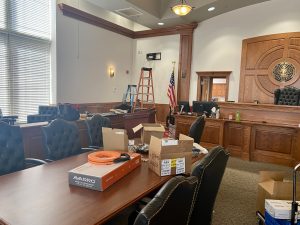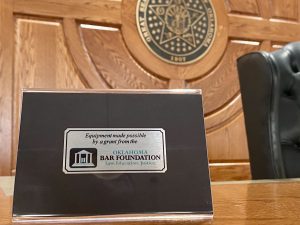Oklahoma Bar Journal
From Courtroom Tech to Case Outcomes: Improving Justice Infrastructure Across Oklahoma
By Renee DeMoss

New technology purchased through the OBF grants is installed in a Pittsburg County courtroom. Previously, the sound system interfered with proceedings, causing witnesses and counsel to turn off the microphones and yell to be heard. Now, this issue has been resolved to better their community.
Courtroom technology is one of the many ways the Oklahoma Bar Foundation is dedicated to bringing justice home. Court grants modernize proceedings, reduce case delays and expand access to justice for vulnerable populations.
This year, the OBF awarded five targeted technology grants to Garvin County, Jackson County, Oklahoma County, Pontotoc County and Tulsa County courts in the total amount of $172,360. These equipment upgrades are the infrastructure investments that enable courts to function more efficiently, fairly and equitably in the face of modern challenges.
For example, Pontotoc County received $50,000 in funds to renovate sound systems in all three of its courtrooms, which suffer from poor acoustics that hinder every hearing. With outdated and failing equipment, jurors, attorneys and spectators struggle to hear witness testimony, which impacts fairness and courtroom efficiency. The upgrade will ensure that legal proceedings, including the many jury trials and numerous daily hearings held each year, are conducted with clarity and accessibility for all participants.

Pittsburg County received two OBF grants in 2024 to improve courtroom communications.
In the Garvin County Courthouse, the OBF is helping with the $15,176 needed to replace a 20-year-old malfunctioning sound system in the associate district judge’s courtroom and update aging digital recording equipment in both primary courtrooms. The current system frequently emits loud popping sounds during testimony, disrupting proceedings and forcing the judge to turn it off altogether. New digital recorders that use SD cards rather than CDs will ensure compatibility across all courtrooms, streamline recordkeeping and assist court reporters with their transcription work.
The Jackson County Courthouse will modernize the audio and video systems in its three courtrooms, two of which rely on outdated systems installed in 2007. The $69,302 technology upgrades will allow the systems to be operated from an iPad and will improve courtroom communications by integrating microphones and speakers. This will ensure that jurors and witnesses can clearly hear testimony, and court reporters can accurately transcribe the proceedings.
The judges’ conference room in the Oklahoma County Courthouse lacks the technology to conduct meetings online. Their new system, which will cost $15,000, will allow judges to remotely conduct and attend meetings and other court-related functions as well as participate in continuing education and other sessions. This will allow judges to be adequately involved and will take less time away from their dockets, contributing to the efficiency of the judicial system.
Finally, Tulsa County received $22,882 in funding to install an intercom system with door releases, enhancing both accessibility and security. Recent courthouse security upgrades restricted physical access to court personnel and judges, frustrating attorneys and members of the public who need information. By installing a video intercom system that allows staff to see who is requesting entry and grant access remotely, the court will streamline interactions and reduce delays in communications.
The 2024 Promoting Access to Justice Survey conducted by the OBF confirms what many attorneys and judges already know: Infrastructure gaps are barriers to accessing legal services. Lawyers surveyed across all 77 counties cited delays and limited courtroom technology as key obstacles preventing clients, particularly those in rural areas, from receiving timely legal relief.
The OBF, along with your support, is honored to fund these critical court grants because justice is better served when every voice in a courtroom is heard. Cases can move forward without unnecessary continuances, remote witnesses can participate, and vulnerable populations, such as those with disabilities or language barriers, can engage in the legal process more fully when the tools to support them are available and functioning properly. For more information on how you can help, please visit www.okbarfoundation.org.
THE STRATEGIC CONNECTION
Findings from the 2024 Legal Needs Survey reinforce the urgency of courtroom technology upgrades:
- 43% of legal professionals cited “inadequate courtroom technology” as a barrier to effective client representation.
- Respondents across rural counties reported frequent hearing delays due to faulty audio systems.
- Technology limitations were linked to longer case timelines and reduced access for clients with disabilities or transportation barriers.
"When audio and video equipment fails, justice is delayed – and sometimes denied."
– 2024 Legal Needs Survey Respondent
ABOUT THE AUTHOR
Ms. DeMoss is the executive director of the Oklahoma Bar Foundation.
Originally published in the Oklahoma Bar Journal – OBJ 96 No. 7 (September 2025)
Statements or opinions expressed in the Oklahoma Bar Journal are those of the authors and do not necessarily reflect those of the Oklahoma Bar Association, its officers, Board of Governors, Board of Editors or staff.
